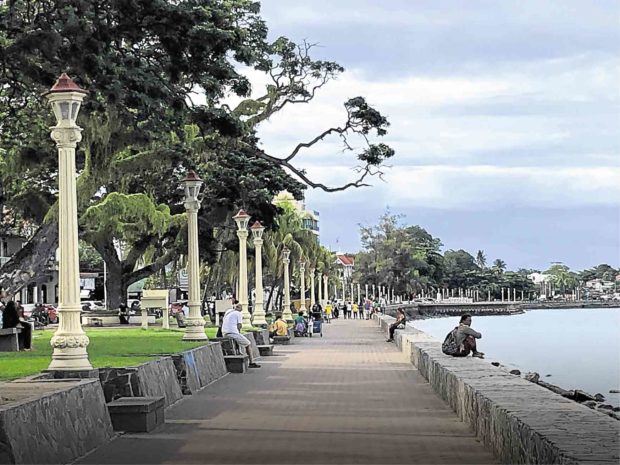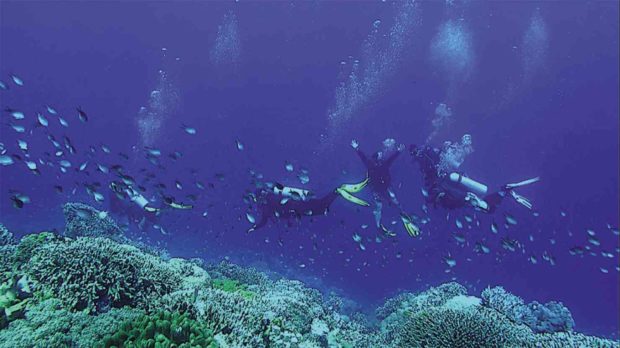Expats find home in Dumaguete

FAVORITE SPOT Rizal Boulevard, named after Dr. Jose Rizal who once walked this path while on a stopover from Dapitan to Manila, is Dumaguete City’s favorite promenade for both locals and expats. —Alex Rey Pal
An American radio broadcaster is bringing over his octogenarian parents from the United States to the Philippines this year.
“They will move here to die here; but before that, they will get a life here in Dumaguete,” Jeff Davis said, who has been living in the last four years in the third-class capital city.
Instead of committing his parents to a nursing home in Arkansas, Davis can provide them with a country home in Dumaguete to enjoy the tropical breeze, with year-round supply of fresh fish, fruits and vegetables, and with a nanny and a driver, who both speak English.
Davis is popularly known in the city as the “Solar Guy.” He founded Visayan Solar Service and has been installing solar panels in schools, shopping malls, local government offices and the Bayawan City Hall.
Solar energy has found an ideal market in Negros Oriental after the provincial government adopted a policy of encouraging only renewable energy sources, taking the lead from the geothermal plants in nearby Valencia town operated by Energy Development Corp.
According to accounts of old-timers, it was the national hero, Dr. Jose Rizal, who first referred to Dumaguete as a “place of gentle people” when he met locals who were strolling along the boulevard. Rizal stopped by the place on his way to Manila from Dapitan in Zamboanga del Norte, where he was exiled.
Visa extension
Davis is one among hundreds of expatriates living the life of a local in this city of Negros Oriental province.
The Philippine Retirement Authority (PRA) has so far listed 225 foreign retirees who have settled in Dumaguete out of a total of 374 who come from China, Korea, India, Taiwan, Japan, Hong Kong, the United States, Germany, Australia and the United Kingdom. Many of them live along the waterfront or in upland areas overlooking the city.
Immigration officer Peter Bueno said foreign tourists must have liked what they experienced in Dumaguete and the rest of Negros Oriental province, citing the number of those applying for visa extension. From January to August this year, 8,605 had applied, led by Americans, Britons, Koreans and Germans.
In August, the PRA, an agency attached to the Department of Tourism, recognized Dumaguete, dubbed the “City of Gentle People,” as the country’s Best Radar (Retirement Area Deemed as Retiree-friendly). The city averaged 87.48 percent in the criteria set in the UN Principles for Older Persons, the International Living Global Retirement Index, the City Age-Friendliness Index of the World Health Organization and the Global AgeWatch Index.
The criteria included cost of living, cheap food, secure housing, variety of leisure and entertainment, people in the locality, integration with the community, weather conditions, availability of modern health care services, tax exemptions on pensions, fast internet service and peace and order situation.
In 2014, Dumaguete was voted fifth among the seven best places in the world to retire, based on the Retirement Overseas Index.
The city and the rest of Negros Oriental are hardly affected by the more than 20 typhoons that hit the country yearly, due to the proximity of the islands of Siquijor, Cebu and Mindanao that act as geographic shields to monsoon winds.

Belgian retiree Ronan Heroufosse (third from right) enjoys riding with the Dumaguete Tindak bikers. —ROEL CADAYDAY
New life in Dumaguete
When Simon Stack and his wife, Virginia Maja-Stack, first came to Dumaguete in 2009, they fell in love with the serenity of Dumaguete Boulevard.
They had been contemplating early retirement from their high-paying jobs in New York City, where they were staying for 25 years.
They were considering to settle in Italy, New Mexico, Jamaica or the Philippines.
Virginia, who was born in Bacolod City in neighboring Negros Occidental province, noted the genuineness and sincerity of the people of Dumaguete.
“When locals ask me, ‘Kumusta ka (How are you)?’ I know it’s not just a greeting, like ‘hello.’ I feel their authenticity in wanting to know how I am doing,” she said.
The couple agreed to give themselves three years to stay in Dumaguete.

WATER FUN Popular diving sites in the Visayas, like the waters off Apo Island, are within reach from Dumaguete. —ALEX REYPAL
“Although I still had 17 years before retirement, I gave up a perfect job in Manhattan, and promised myself, ‘We’d better live a life way better than the one we were living in New York,’” Virginia recalled.
She was not disappointed.
Community interaction
On their first Christmas here, they secretly distributed food packs to about 60 households in their neighborhood. The next morning, the neighbors came by to thank the couple.
“They are very decent people,” Virginia said.
Three years later, Simon’s mother came to visit from Jamaica and had a taste of their minimalist lifestyle. She then decided, right there and then, to build a home for herself and live there.
Learning from locals
“Learning from the locals can never be equated with any amount in dollars. The gratification I earn from helping others is more than money can ever buy,” she said.
“The people are without frills, we have meaningful conversations, we have time to learn other things. It calms me down,” Virginia said.
Expat-retirees in Siaton town, 50 kilometers south, do not mind taking the bus for about an hour to do their grocery shopping in Dumaguete.
Diane Pool, who is from San Francisco, California, and her husband Bill were sailing around Micronesia in 1991 when another cruiser told them to check out Tambobo Bay in Negros Oriental.
“It just happened that we stayed,” Pool said. “Retirement never entered our minds then because there was always work on our boat demanding attention.”
Pool has been staying in Negros Oriental for the last 18 years “for love of the local people, the culture and the emphasis on relationships among families and friends.”
She described the weather and the cost of living as just right, “but it is the community that I most appreciate; they are genuinely-caring.”
Fitting in
According to International Living magazine, the Philippines ranked highest in terms of “fitting in” based on the 2018 Annual Global Retirement Index.
“Fitting in” refers to the ease by which retirees are able to make friends with locals, the character and size of the expatriate community, the variety of clubs and activities available for them, whether English is widely spoken, the language’s level of difficulty and the ease of acquiring comfort food.
With a population of about 132,000, Dumaguete is home to three well-equipped hospitals that cater to patients even coming from Dipolog City in Zamboanga del Norte province, and south of Cebu province. Two more private hospitals will open by the first quarter of 2019.
University town
Dumaguete is also known as a “university town” because of the presence of four academic institutions in an area of 34 square km. These are St. Paul University, which was established in 1904; Silliman University, the United States’ first school in Asia; Foundation University, established by former University of the Philippines president Vicente Sinco; and Negros Oriental State University.
Immigration officer Bueno noted an increase in the number of expatriates after processing close to 750 applications for Special Student Permits in 2017, mainly from Korea, Japan, Indonesia and the United States, including their families.
In August, the figure reached 672, excluding the applications of hundreds of other international students enrolled in college and who secure student visas in Metro Manila.
“Studying in Dumaguete allowed me to live in paradise while obtaining quality education at Silliman,” said Tom Delbaere, a Belgian who earned his mass communication degree here.
Korean Yejin Hwang said she was glad her parents sent her abroad to study at Silliman.
“Dumaguete is quiet, the trees are green, the sea is blue, and it’s always fun at the beach. It made us students calm and happy. The people are kind; even foreigners would start acting kind like locals,” she said.















